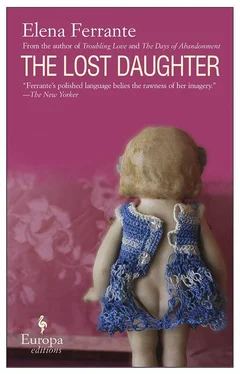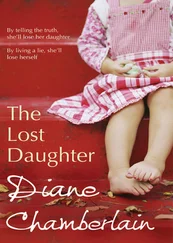Elena Ferrante - The Lost Daughter
Здесь есть возможность читать онлайн «Elena Ferrante - The Lost Daughter» весь текст электронной книги совершенно бесплатно (целиком полную версию без сокращений). В некоторых случаях можно слушать аудио, скачать через торрент в формате fb2 и присутствует краткое содержание. Год выпуска: 2008, Издательство: Europa Editions, Жанр: Современная проза, на английском языке. Описание произведения, (предисловие) а так же отзывы посетителей доступны на портале библиотеки ЛибКат.
- Название:The Lost Daughter
- Автор:
- Издательство:Europa Editions
- Жанр:
- Год:2008
- ISBN:нет данных
- Рейтинг книги:3 / 5. Голосов: 1
-
Избранное:Добавить в избранное
- Отзывы:
-
Ваша оценка:
- 60
- 1
- 2
- 3
- 4
- 5
The Lost Daughter: краткое содержание, описание и аннотация
Предлагаем к чтению аннотацию, описание, краткое содержание или предисловие (зависит от того, что написал сам автор книги «The Lost Daughter»). Если вы не нашли необходимую информацию о книге — напишите в комментариях, мы постараемся отыскать её.
,
is Elena Ferrante's most compelling and perceptive meditation on womanhood and motherhood yet. Leda, a middle-aged divorce, is alone for the first time in years when her daughters leave home to live with their father. Her initial, unexpected sense of liberty turns to ferocious introspection following a seemingly trivial occurrence. Ferrante's language is as finely tuned and intense as ever, and she treats her theme with a fierce, candid tenacity.
The Lost Daughter — читать онлайн бесплатно полную книгу (весь текст) целиком
Ниже представлен текст книги, разбитый по страницам. Система сохранения места последней прочитанной страницы, позволяет с удобством читать онлайн бесплатно книгу «The Lost Daughter», без необходимости каждый раз заново искать на чём Вы остановились. Поставьте закладку, и сможете в любой момент перейти на страницу, на которой закончили чтение.
Интервал:
Закладка:
Nina wasn’t there yet, nor was Elena. There were the children who had distributed the flyers the day before, and in no order, late and wearily, cousins, brothers, in-laws—all the relatives appeared. Last—it was almost midday—came Rosaria and Corrado, she in front, in her bathing suit, displaying the enormous stomach of a pregnant woman who does not bow to any diet but carries her belly with confidence, no fuss, followed by him, in undershirt, shorts, sandals, at a careless pace.
My agitation returned; my heart was racing. Nina, it was clear, wasn’t coming to the beach, maybe the child was sick. I stared insistently at Rosaria. She had a grim look, and never glanced in my direction. I tried to catch Gino’s eye, perhaps he knew something, but I realized that his place was empty, the book abandoned, open on the chair.
As soon as I saw Rosaria leave the umbrella and move off alone, legs wide, toward the shore, I joined her. She wasn’t happy to see me and did nothing to hide it. She responded to my questions in monosyllables, coldly.
“How’s Elena?”
“She has a cold.”
“Does she have a fever?”
“Slight.”
“And Nina?”
“Nina is with her daughter, as she should be.”
“I saw the flyer.”
She frowned with disapproval.
“I told my brother it was pointless, fucking waste of time.”
She was translating directly from dialect as she spoke. I was on the point of telling her yes, it’s pointless, fucking waste of time: I have the doll, now I’ll take it to Elena. But her hostile tone dissuaded me, I didn’t feel like telling her, I didn’t feel like telling anyone in the clan. Today I saw them not as a spectacle to be contemplated, compared painfully to what I remembered of my childhood in Naples; I felt them as my time, my own swampy life, which occasionally I still slipped into. They were just like the relations from whom I had fled as a girl. I couldn’t bear them and yet they held me tight, I had them all inside me.
Life can have an ironic geometry. Starting from the age of thirteen or fourteen I had aspired to a bourgeois decorum, proper Italian, a good life, cultured and reflective. Naples had seemed a wave that would drown me. I didn’t think the city could contain life forms different from those I had known as a child, violent or sensually lazy, tinged with sentimental vulgarity or obtusely fortified in defense of their own wretched degradation. I didn’t even look for them, those forms, in the past or in a possible future. I had run away like a burn victim who, screaming, tears off the burned skin, believing that she is tearing off the burning itself.
What I most feared, when I left my daughters, was that Gianni, out of laziness, revenge, necessity, would take Bianca and Marta to Naples, entrust them to my mother and my relatives. I was suffocating with anxiety, I thought: what have I done, I’ve escaped, but I’m letting them go back there. The two girls would slowly sink into the black well I came from, breathing the habits, the language, all the features I had eliminated from myself when, at eighteen, I left the city to study in Florence, a place that was distant and for me foreign. I had said to Gianni: do what you want but please, don’t leave them with their relatives in Naples. Gianni screamed at me that he would do with his daughters what he liked. If I was leaving I had no right to interfere. He took good care of them, in fact, but when he was overwhelmed by work or forced to travel abroad, he took them without hesitation to my mother’s house, to the apartment where I was born, the rooms from which I had fought fiercely to free myself, and left them there for months.
The news reached me, I regretted it, but not even for that did I retrace my steps. I was far away; it seemed to me that I was another person, finally the real one, and in the end I let my children be exposed to the wounds of my native city, the ones that in myself I considered incurable. My mother had been wonderful at the time, she had taken care of them, had worn herself out, but I had showed her no gratitude, for that or anything else. The secret rage I harbored against myself I turned on her. Later, when I reclaimed my daughters and brought them to Florence, I accused her of having branded them, as she had branded me. Wicked accusations. She defended herself, she reacted spitefully, extremely upset, and died shortly afterward, perhaps poisoned by her own unhappiness. The last thing she said to me, some time before she died, was, in a fractured dialect, I feel a little cold, Leda, and I’m shitting my pants.
How many things did I scream at her that it would have been better not even to think. I wanted—now that I had come back—my daughters to depend only on me. At times it even seemed to me that I had created them by myself, I no longer remembered anything about Gianni, nothing intimately physical, his legs, his chest, his sex, his taste, as if we had never touched each other. When he went to Canada, that impression hardened, that I had nourished the girls only on myself, that I sensed in them only the female line of my descent, for good and ill. So my anxieties increased. For several years Bianca and Marta did badly in school, obviously they were upset. I got mad at them, pushed them, harassed them. I said: what do you want to do in life, where do you want to end up, do you want to go backward, degrade yourselves, abolish all the efforts your father and I have made, return to being like your grandmother, who got no farther than elementary school. To Bianca I murmured, depressed: I’ve spoken to your teachers, how you’ve embarrassed me. I saw them both going off track, they seemed to me more and more pretentious and ignorant. I was sure that they would fail in their studies, in everything, and there was a period when I relaxed only when I knew they had been disciplined; then they began to do well at school, and the shadows of the women of my family vanished.
Poor Mama. In the end what was so terrible about what she passed on to the two girls: nothing, a bit of dialect. Thanks to her, today Bianca and Marta can reproduce the Neapolitan cadence and a few expressions. When they’re in a good mood they laugh at me. They exaggerate my accent, even on the telephone, from Canada. They cruelly mock the timbre of the dialect that surfaces from within the way I speak languages, or certain Neapolitan formulations that I use, Italianizing them. Fucking waste of time. I smile at Rosaria, I search for something to say, I expect good manners even if she hasn’t any. Yes, my daughters humiliate me, especially with English, they are ashamed of the way I speak; I realized it when we went abroad together. And yet it is the language of my profession, it seemed to me that my use of it was unexceptionable. They, however, insist that I’m not very good, and they’re right. In fact, despite my breaking away, I haven’t gone very far. If I wanted, in a moment I could go back to being just like this woman, Rosaria. Certainly, it would take some doing; my mother could pass without interruption from the fiction of the petit bourgeois lady to the tormented surge of her unhappiness. I would have to work harder, but I could manage it. The two girls, on the other hand—they’ve gone far away. They belong to another time, I’ve lost them to the future.
I smile again, embarrassed, but Rosaria doesn’t smile back at me, the conversation ends. I hesitate, now, between a frightened aversion toward this woman and a sad sympathy. I imagine she’ll give birth without strain, in two hours she’ll expel herself and, at the same time, another just like her. The next day she’ll be on her feet, she’ll have plenty of milk, a river of nourishing milk, she’ll return to battle, vigilant and violent. It’s clear to me, now, that she doesn’t want me to see her sister-in-law, she considers her—I imagine—a pain in the ass who puts on airs, a sissy who during her own pregnancy was always complaining, throwing up. Nina to her is soft, liquid, open to all kinds of bad influences, and I, after my brutal confession, am no longer considered a good friend from the beach. So she wants to protect her from me, afraid I’ll put ideas in her head. She keeps watch in the name of her brother, the man with the slashed stomach. Bad people, Gino had told me. I was still standing with my feet in the water, I didn’t know what to say to her. Like a magnet, the present—yesterday, today—was drawing to itself all the past days of my life. I went back to my umbrella.
Читать дальшеИнтервал:
Закладка:
Похожие книги на «The Lost Daughter»
Представляем Вашему вниманию похожие книги на «The Lost Daughter» списком для выбора. Мы отобрали схожую по названию и смыслу литературу в надежде предоставить читателям больше вариантов отыскать новые, интересные, ещё непрочитанные произведения.
Обсуждение, отзывы о книге «The Lost Daughter» и просто собственные мнения читателей. Оставьте ваши комментарии, напишите, что Вы думаете о произведении, его смысле или главных героях. Укажите что конкретно понравилось, а что нет, и почему Вы так считаете.












